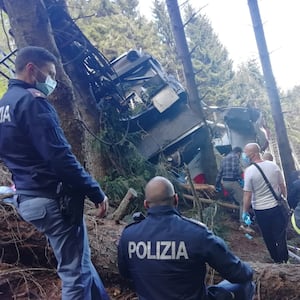Under almost any other circumstance, being the sole survivor of a horrific cable-car accident might be the worst experience imaginable. But for 6-year-old Eitan Biran, who lost almost his entire family when the cable car that he and 14 others were riding in plummeted to the ground in northern Italy, it was only the beginning.
Eitan, who was kidnapped by his maternal grandfather in September and taken to Israel, will now have to be returned to Italy to live with his paternal aunt.
After spending more than two months recovering from injuries in a hospital in northern Italy, custody of Eitan was given by an Italian family court to his father’s sister Aya Biran-Nirko, who, like Eitan and his parents, were living in Italy when the accident occurred. Biran-Nirko’s own 6-year-old was like a brother to Eitan before the accident and during his difficult recovery, and was ready to start school with him in September in their small town near Pavia.
The dramatic accident happened when the cable car that ferried tourists from Lake Maggiore to a summit 5,000 feet above it slid off its cable and fell to the ground. Investigators are looking at the circumstances around the crash and say that the car’s brakes were jimmied open to override a warning signal and had been left that way for months.
In September, Eitan’s maternal grandfather, retired Israeli Defense Force Officer Shmulik Peleg, apparently decided that the boy needed to be raised in Israel, believing his late daughter—Eitan’s mother—would have wanted it that way. So the grandfather kidnapped the boy, drove him over the border to Switzerland, and took him by private jet back to Israel.
Peleg was not arrested for kidnapping, but a court in Tel Aviv ruled Monday that he violated the Hague Convention when he took his grandchild, ordering “the return of the minor to his usual place of residence in Italy.” Judge Iris Ilotovich-Segal ruled that the boy must be returned to Italy to live with his paternal aunt, ruling that because Eitan had been living in Italy since he was just 2 months old, it was his familial home. (Peleg was also ordered to pay the aunt’s legal expenses.) Peleg had argued that Eitan was not getting the proper medical and psychological care he needed after the accident, and claimed that his daughter had confided in him that she wanted to return to Israel to raise Eitan and his younger brother, who died in the accident.
The judge said the ruling would take effect in a week, allowing Peleg an opportunity to launch an appeal, though she said that ideally, the two families should work together to find an amicable solution so the young survivor would have a chance to get to know both families. “Such a connection that will allow him to feel a sense of belonging and a place to continue the legacy of the two families and to commemorate the memory of his immediate family,” she said in her reasoning. “There is always a choice regarding actions to be taken later. Hope has not yet been lost to mend the rift of the families.”
Peleg says he and his family do not agree with the ruling and will fight to either keep Eitan in Israel or to legally return him through the courts. “The family is determined to continue to fight in all possible ways, for the good of Eitan, his well-being and his right to grow up in Israel as his parents desired,” Peleg said in a statement after the ruling.
Eitan’s aunt’s family told Italian media that there were “no winners or losers” in the tragic story, but that it was now simply time to “think only of Eitan.” The family’s Israeli lawyer, Shmuel Moran, added, “There are no winners in the legal process here, except for one winner, Eitan, who needs to return home as soon as possible.”






